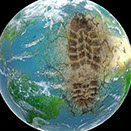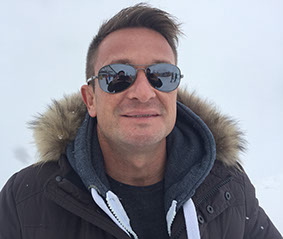
Investigating man’s impact on the earth
In his project proposal Louis indicated that international environmental law, with multicultural environment agreements as its main component, is not yet able to address the underlying causes of the socio-ecological crisis of the Anthropogenic era.
The Anthropogenic era is a geological era, or epoch, which began when human beings started making a significant impact on the earth and its various natural systems.
“We have entered a new geological epoch and I hope this study will provide us with a helpful lens through which to investigate the impact of humans on the earth and to develop more suitable legal methods to address the Anthropogene’s socio-ecological crisis,” explains this 40-year-old who originally hailed from Johannesburg.
According to the European Commission’s assessment of Louis’s application, the scientific interest of his project lies in its original contribution as the first multi-disciplinary study to view international environmental law through the lens of the Anthropogene and its associated constructs.
Quite overwhelming
“This is very exciting, but also a bit overwhelming. All the logistical arrangements and the prospect of bleak weather are not really too good! And I will definitely miss our sunny country and its warm-hearted people,” says Louis.
Opportunities and a difficult “goodbye” await him. “My family is very excited, although my mother not so much as I. She already says that she is going to miss me very much. My father has never been to Europe, so this will now be an ideal opportunity for him to visit.”
However, there is an additional silver lining. Louis’s partner, Professor Klaus Zweckberger, works as a neuro-surgeon in Heidelberg, Germany. “I hope to see him more often now.”
NWU will benefit too
“This is my biggest and longest research grant to date and I know that it is an excellent opportunity to conduct good research that will benefit the NWU. I hope that a monograph can be produced from this.”
He plans to return home with a few more contacts. “Another goal is to expand the NWU’s internationalisation and bring a global network back to Africa,” says the man who boasts two doctorates, as well as an NRF P rating.
Yes, he will miss the sun, and his friends too. What he will not miss is the intrusion of the everyday tasks of his current position. “I am currently a research professor, which means that I cannot complain too much about admin, but I am looking forward to having even more time for pure research. It will also be good to concentrate on one project only. Research is about quality and not quantity.”
“I feel like the proverbial fox terrier that has caught the bus.”
Yes, it still seems unreal to Prof Louis Kotzé, because the journey he is about to take is not on any old “bus”.
In January this year Louis, a research professor at the Faculty of Law on the Potchefstroom Campus who focuses on environmental law, received the good news about his successful application for the much sought-after European Commission Horizon 2020 Marie Curie grant. The total amount of the grant is €180 000 over 24 months.
His research period will start in October this year when he leaves for Lincoln University in England, where he will work with Duncan French, the well-known head of Lincoln University’s School of Law.
Lincoln is a small but beautiful cathedral town in the eastern midlands of England. The town is especially well known for the fact that it houses one of the last remaining copies of the Magna Carta, a 1215 document constituting a fundamental guarantee of rights and privileges.
After his stint in Lincoln, Louis will visit the University of Utrecht in the Netherlands for six months, working with Frank Biermann, the world leader in the field of earth system regulation, before he returns to Lincoln for the rest of the time.
European honour for Louis Kotzé
SCROLL DOWN



Prof Louis Kotzé is the recipient of the prestigious Marie Curie grant of €180 000 over two years. Here he is seen enjoying a visit to the Austrian Alps early last year.
Hover to read more
